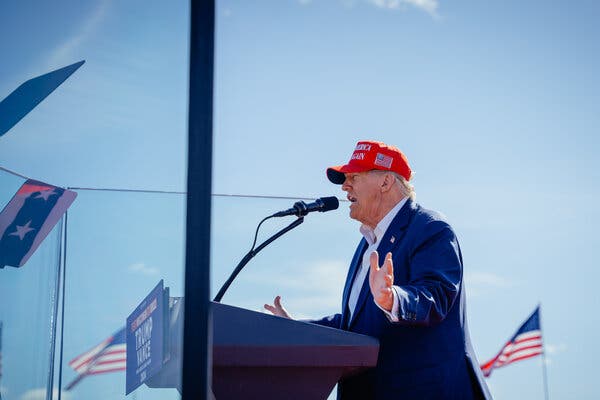Trump Administration Considers Tariffs On Aircraft And Engines

Table of Contents
Potential Targets and Justification for Tariffs
The potential imposition of tariffs on aircraft and engines is deeply rooted in the ongoing trade dispute between the US and the EU. The Trump administration's justification centers on allegations of unfair subsidies provided to Airbus by European governments, creating an uneven playing field for Boeing. This argument is supported by a long-running World Trade Organization (WTO) dispute, where the US has repeatedly claimed that Airbus has benefited from illegal state aid, distorting the market.
- Airbus and Boeing as Primary Targets: The tariffs would likely impact both the manufacturing of aircraft and their essential components, such as engines. Specific aircraft models and engine types could face significantly increased import duties, impacting their competitiveness in the global market.
- WTO Dispute as Catalyst: The ongoing WTO dispute provides the legal framework for the Trump administration's retaliatory actions. A WTO ruling authorizing the US to impose tariffs on Airbus would legitimize the action in the eyes of international trade law.
- Retaliatory Measures: The proposed tariffs are viewed as a direct retaliation against the EU for alleged subsidies provided to Airbus, mirroring earlier WTO findings that found Boeing had also received illegal subsidies. This sets a precedent for further escalation of trade tensions.
Economic Impact of Aircraft and Engine Tariffs
The economic consequences of tariffs on aircraft and engines are potentially vast and multifaceted, affecting both the domestic US economy and the global landscape. The ripple effects would extend far beyond the aerospace industry itself.
- Impact on US Aerospace Manufacturers: While initially intended to counter European subsidies, tariffs could inadvertently harm US aerospace manufacturers relying on imported components or exporting to international markets. Increased costs could lead to reduced competitiveness and potential job losses.
- Supply Chain Disruptions: The aerospace industry relies on intricate global supply chains. Tariffs would disrupt these chains, increasing costs and causing delays in aircraft production and delivery.
- Inflationary Pressures: Increased costs for aircraft and components would likely be passed on to consumers in the form of higher airfares and more expensive aircraft-related goods. This would have a direct impact on consumers and overall inflation.
- Global Economic Fallout: The imposition of tariffs could trigger retaliatory measures from the EU and other countries, leading to a full-blown trade war that would negatively impact global economic growth. Uncertainty in the international market would hamper investment and trade.
Impact on the Airline Industry
The airline industry would be significantly impacted by tariffs on aircraft and engines. Higher acquisition costs for new aircraft and increased maintenance expenses due to tariffs on spare parts would translate directly into increased operational costs for airlines. This almost certainly will result in higher ticket prices for passengers, reducing affordability and impacting travel demand. Airlines might also delay aircraft upgrades or expansion plans, affecting overall industry growth.
International Relations and Trade Wars
The proposed tariffs have significant implications for US international relations, particularly with the EU. The move risks escalating trade tensions and potentially undermining existing trade agreements.
- Retaliatory Tariffs: The EU is likely to respond with retaliatory tariffs on US goods, potentially targeting sectors like agriculture or technology. This tit-for-tat response could further damage international trade relations.
- Strained US-EU Relations: The imposition of tariffs would strain already fragile relations between the US and the EU, potentially hampering cooperation on other crucial global issues.
- Damage to Global Trade Agreements: The dispute could undermine the credibility of the WTO and existing international trade agreements, creating uncertainty and potentially leading to a more protectionist global trade environment.
Conclusion
The Trump administration's consideration of tariffs on aircraft and engines carries significant economic and geopolitical risks. The potential for escalating trade tensions, increased consumer prices, job losses, and disruption of global supply chains is substantial. Further retaliatory measures from the EU and other nations could exacerbate the situation and trigger a global trade war. The long-term economic consequences of these proposed tariffs on aircraft and engines demand careful consideration and monitoring.
Call to Action: The potential impact of the Trump administration’s consideration of tariffs on aircraft and engines is significant and warrants continued monitoring. Stay informed about developments regarding aircraft and engine tariffs and their potential influence on the global economy by regularly checking our website for updates. Further research into the intricacies of these proposed tariffs on aircraft and engines is crucial for understanding the long-term economic effects.

Featured Posts
-
 Tyreek Hill Vs Noah Lyles Michael Johnsons Take On The Hypothetical Race
May 11, 2025
Tyreek Hill Vs Noah Lyles Michael Johnsons Take On The Hypothetical Race
May 11, 2025 -
 Possible Successors To Pope Francis Exploring The Next Papal Election
May 11, 2025
Possible Successors To Pope Francis Exploring The Next Papal Election
May 11, 2025 -
 Second Tech Outage At Newark Airport Passengers Face Delays
May 11, 2025
Second Tech Outage At Newark Airport Passengers Face Delays
May 11, 2025 -
 Tennessee Baseball Rallies Past Lsu Splits Weekend Series
May 11, 2025
Tennessee Baseball Rallies Past Lsu Splits Weekend Series
May 11, 2025 -
 Sydney Mc Laughlin Levrone Sets New 400m Hurdle World Lead At Miami Grand Slam
May 11, 2025
Sydney Mc Laughlin Levrone Sets New 400m Hurdle World Lead At Miami Grand Slam
May 11, 2025
